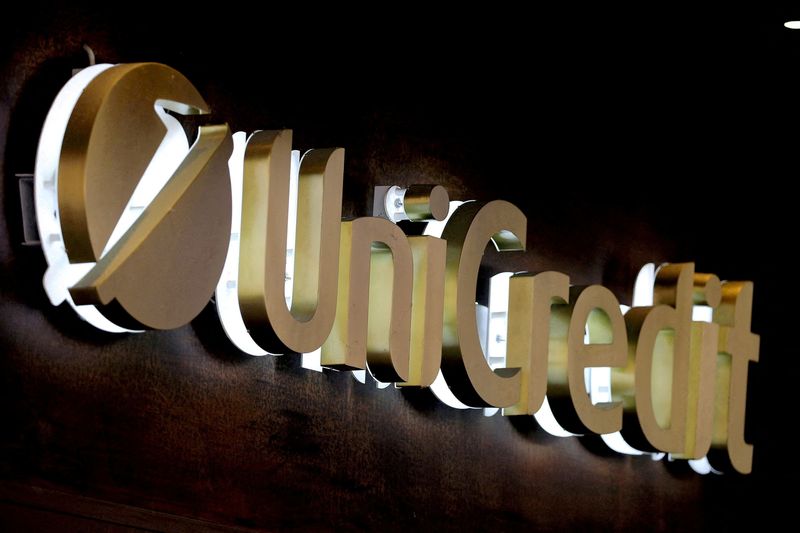Analysis-UniCredit’s Orcel takes aim at Europe’s banking borders with Commerzbank bet
2024.09.19 14:23
By John O’Donnell
FRANKFURT (Reuters) – For decades, Andrea Orcel was the ‘rainmaker’ who CEOs turned to for advice on the big deals that reshaped the banking landscape.
Now, as UniCredit chief executive, the Italian has set himself his biggest test so far — breaking down Europe’s deeply entrenched political resistance to cross-border mergers.
Orcel signalled his merger ambitions last week when his Italian bank swooped on Commerzbank (ETR:), becoming its second-biggest shareholder behind the German government, which holds a stake after a crisis-era rescue.
UniCredit’s move — codenamed ‘Flash’ after Orcel’s dog — has triggered a frenzied search for direction in Berlin, opposition from labour unions and a defence strategy from Germany’s second-largest listed lender.
Orcel now wants to start talks on a combination he says would “create a much stronger competitor” in Germany. His gambit comes after years of calls for Europe to improve its banks’ competitiveness in the face of larger U.S. and Asian rivals.
He faces big hurdles.
Cross-border European banking deals have been stymied by factors including years of paltry profitability that have left lenders too weak to try. And regulatory barriers to moving resources freely across borders have been reinforced by a preference for home-grown ‘champions’ among politicians.
A turnaround of UniCredit has overcome one of the obstacles. The bank, unlike rivals, has the financial firepower for a bold combination after reaping bumper profits.
But national politics will be the hard part.
“Most European countries have overpriced banking services because they are in the hands of a handful of local banks,” said Karel Lannoo of the Centre for European Policy Studies.
“The German reaction to UniCredit’s interest in Commerzbank shows the resistance to changing this,” Lannoo said. “It is the Italians coming to teach the Germans a lesson in the free market and the Germans don’t like it.”
Some in Germany’s government have been annoyed by what they saw as a stealth move by UniCredit, which built up its 9% stake overnight, one source told Reuters.
UniCredit said it had been transparent with its move, which comes at a delicate time in Germany, with its coalition government, one of the most unpopular in recent history, preparing for national elections next year.
Recent gains for the far-right and far-left are squeezing the three-party coalition and, in particular, the smallest member, the liberal FDP party, which runs the finance ministry.
Meanwhile, Rome views Milan-based UniCredit’s efforts to build a large European bank favourably as long as it keeps its central functions in Italy, sources close to the matter said.
Nonetheless, Italy is keeping its distance and there are no moves to back UniCredit’s foray, a senior official told Reuters.
‘COUNTRY BLIND’
A UniCredit-Commerzbank tie-up would be the biggest cross-border European banking deal since the global financial crisis.
Orcel is betting UniCredit’s existing ties in Germany – it owns already owns German lender HVB – and ambition for a combined group will persuade politicians.
“Europe needs banks that are capable to support each industry and the development of Europe so that we are an economic bloc that can hold its own against the U.S. and China,” Orcel told Bloomberg last week.
This echoes a long-running message from officials in Brussels, Europe’s political meeting point.
Last week, in a sweeping report on how to make Europe more competitive, former European Central Bank president Mario Draghi urged the EU to tackle the obstacles to cross-border banking.
Orcel, who walked away from an initial agreement to buy troubled Monte dei Paschi in 2021, upending then Italian Prime Minister Draghi’s efforts to resolve the bank’s long-running problems, can be uncompromising.
UniCredit has sued its chief supervisor, the ECB, which has ordered it to retreat in Russia.
In the face of considerable resistance in Germany, Orcel ruled out a hostile bid on Thursday, softening his approach.
If he pulls it off, a deal could rewire thinking elsewhere in Europe.
“Imagine if someone today were to make a bid for the government stake in Monte Dei Paschi, they will never manage to pull it off,” said Algebris Chief Investment Officer Sebastiano Pirro.
“If (France’s) BNP were to bid, it would be simply impossible. They have a preference for that to remain domestically. But if UniCredit were to buy a German bank, then all options are on the table,” said Pirro, whose hedge fund is an investor in UniCredit and Commerzbank and backs a tie-up.
‘WORK IN PROGRESS’
Orcel’s next test is getting ECB approval to buy up to 30% of Commerzbank. Analysts think it is unlikely to stand in the way, given years of calling for such deals.
“The European single market in financial services is a work in progress but mergers like UniCredit and Commerzbank would help turn it into a reality,” said Nicolas Veron of Brussels think tank Bruegel.
Some question if Orcel should even be attempting a deal.

M&A “needs to be complementary; it needs to be voluntary, and often, very often, it needs to be in the same country,” said Patrick Lemmens, fund manager at Robeco who owns shares in UniCredit.
“The moment you go across borders and there’s little overlap, it becomes just more difficult.”








